Enterprise Resources Planning: Enhanced the Data Collection
VerifiedAdded on 2023/01/12
|9
|2523
|33
AI Summary
This report discusses the concept of enterprise resource planning (ERP) and its impact on decision-making in Next Plc. It explores different categories of information systems and provides an overview of ERP systems. The report also highlights the benefits of ERP systems in real-life businesses.
Contribute Materials
Your contribution can guide someone’s learning journey. Share your
documents today.
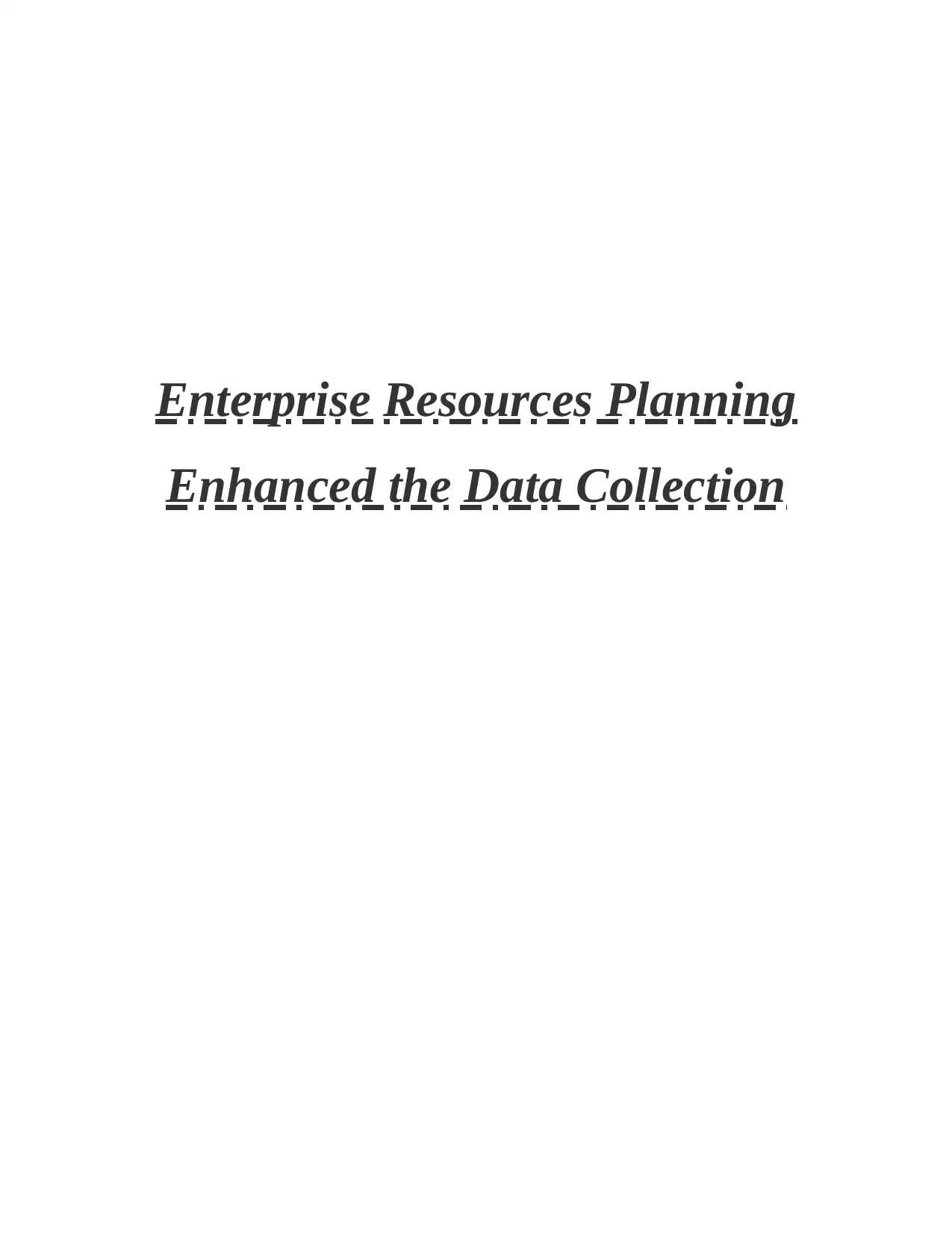
Enterprise Resources Planning
Enhanced the Data Collection
Enhanced the Data Collection
Secure Best Marks with AI Grader
Need help grading? Try our AI Grader for instant feedback on your assignments.
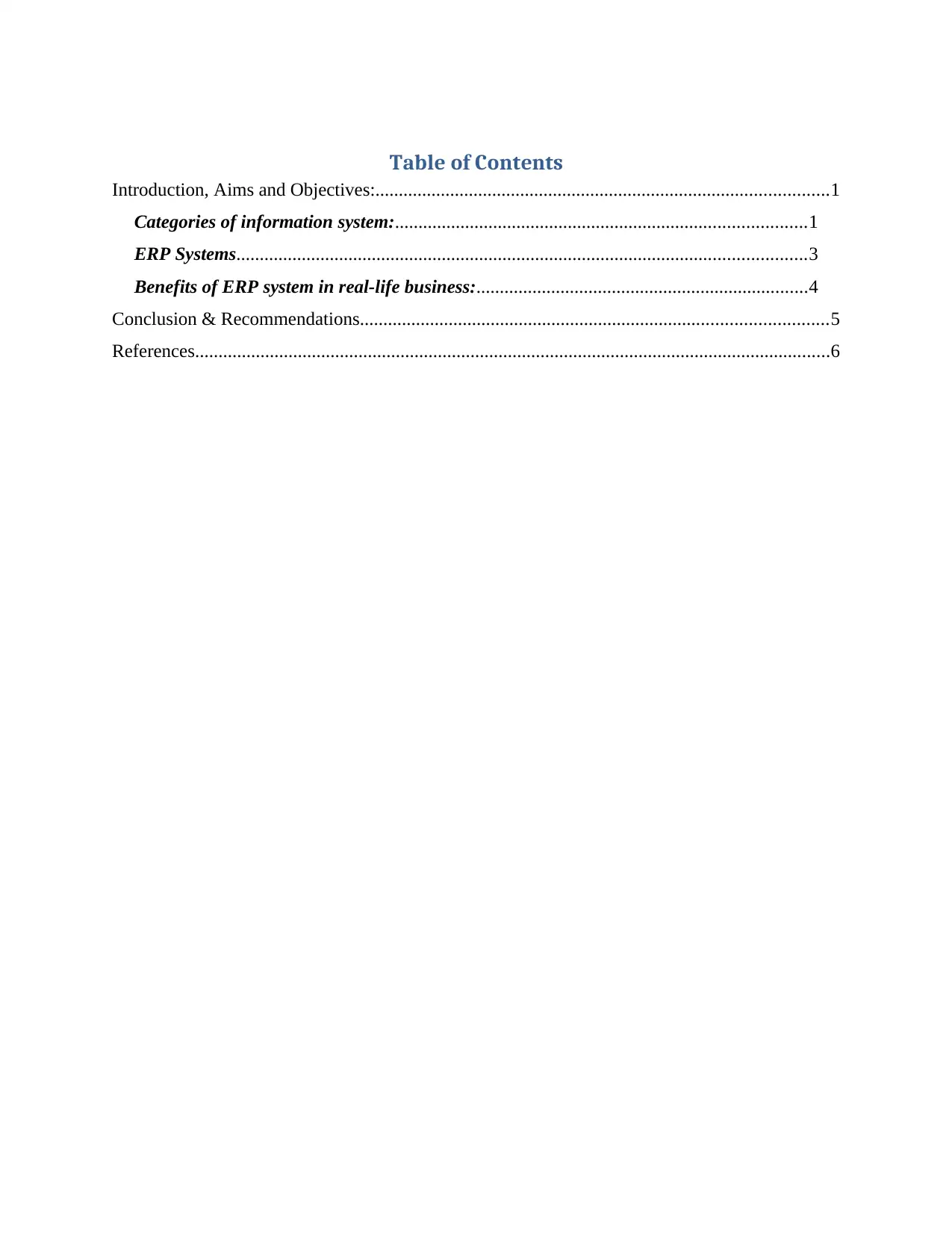
Table of Contents
Introduction, Aims and Objectives:.................................................................................................1
Categories of information system:........................................................................................1
ERP Systems..........................................................................................................................3
Benefits of ERP system in real-life business:.......................................................................4
Conclusion & Recommendations....................................................................................................5
References........................................................................................................................................6
Introduction, Aims and Objectives:.................................................................................................1
Categories of information system:........................................................................................1
ERP Systems..........................................................................................................................3
Benefits of ERP system in real-life business:.......................................................................4
Conclusion & Recommendations....................................................................................................5
References........................................................................................................................................6

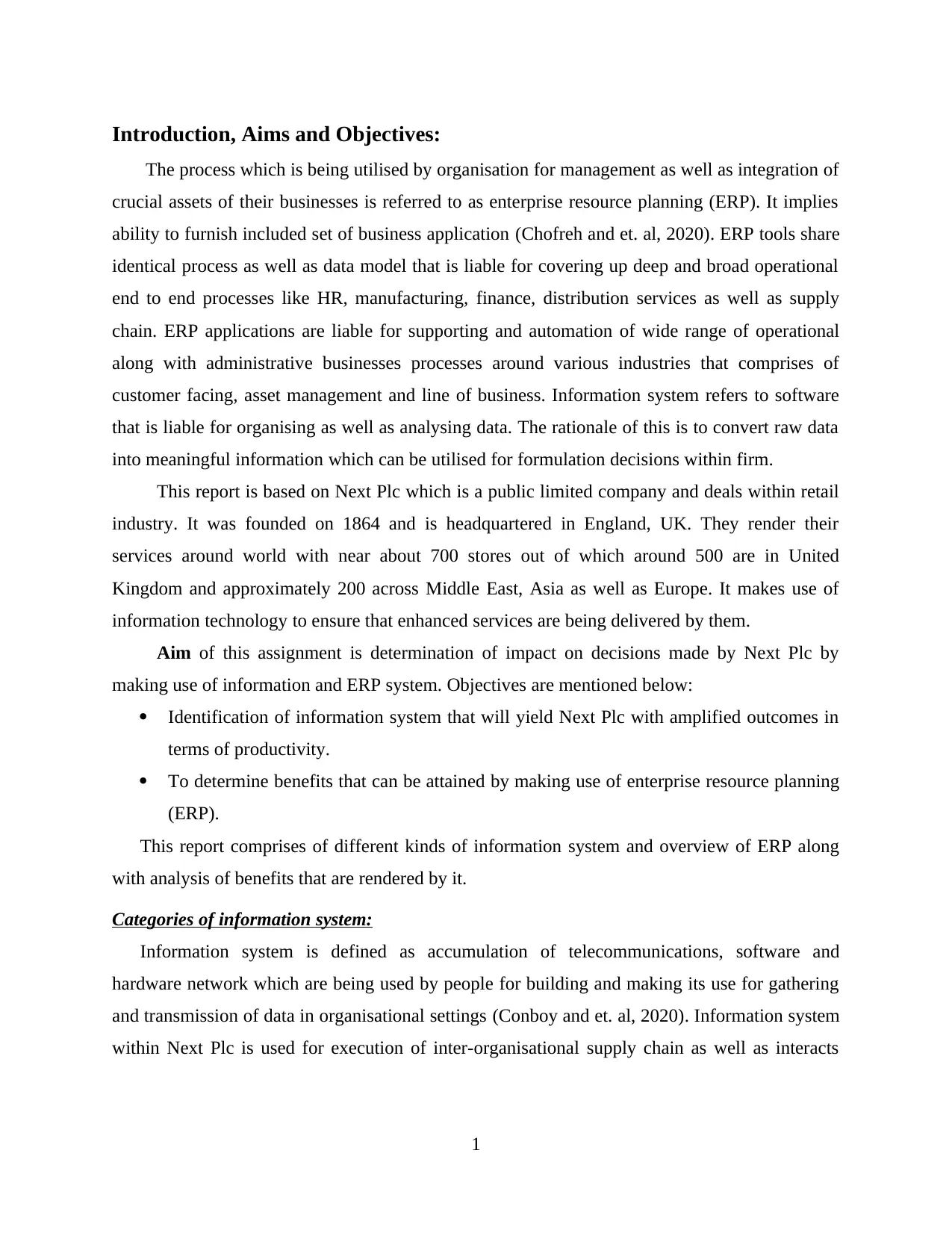
Introduction, Aims and Objectives:
The process which is being utilised by organisation for management as well as integration of
crucial assets of their businesses is referred to as enterprise resource planning (ERP). It implies
ability to furnish included set of business application (Chofreh and et. al, 2020). ERP tools share
identical process as well as data model that is liable for covering up deep and broad operational
end to end processes like HR, manufacturing, finance, distribution services as well as supply
chain. ERP applications are liable for supporting and automation of wide range of operational
along with administrative businesses processes around various industries that comprises of
customer facing, asset management and line of business. Information system refers to software
that is liable for organising as well as analysing data. The rationale of this is to convert raw data
into meaningful information which can be utilised for formulation decisions within firm.
This report is based on Next Plc which is a public limited company and deals within retail
industry. It was founded on 1864 and is headquartered in England, UK. They render their
services around world with near about 700 stores out of which around 500 are in United
Kingdom and approximately 200 across Middle East, Asia as well as Europe. It makes use of
information technology to ensure that enhanced services are being delivered by them.
Aim of this assignment is determination of impact on decisions made by Next Plc by
making use of information and ERP system. Objectives are mentioned below:
Identification of information system that will yield Next Plc with amplified outcomes in
terms of productivity.
To determine benefits that can be attained by making use of enterprise resource planning
(ERP).
This report comprises of different kinds of information system and overview of ERP along
with analysis of benefits that are rendered by it.
Categories of information system:
Information system is defined as accumulation of telecommunications, software and
hardware network which are being used by people for building and making its use for gathering
and transmission of data in organisational settings (Conboy and et. al, 2020). Information system
within Next Plc is used for execution of inter-organisational supply chain as well as interacts
1
The process which is being utilised by organisation for management as well as integration of
crucial assets of their businesses is referred to as enterprise resource planning (ERP). It implies
ability to furnish included set of business application (Chofreh and et. al, 2020). ERP tools share
identical process as well as data model that is liable for covering up deep and broad operational
end to end processes like HR, manufacturing, finance, distribution services as well as supply
chain. ERP applications are liable for supporting and automation of wide range of operational
along with administrative businesses processes around various industries that comprises of
customer facing, asset management and line of business. Information system refers to software
that is liable for organising as well as analysing data. The rationale of this is to convert raw data
into meaningful information which can be utilised for formulation decisions within firm.
This report is based on Next Plc which is a public limited company and deals within retail
industry. It was founded on 1864 and is headquartered in England, UK. They render their
services around world with near about 700 stores out of which around 500 are in United
Kingdom and approximately 200 across Middle East, Asia as well as Europe. It makes use of
information technology to ensure that enhanced services are being delivered by them.
Aim of this assignment is determination of impact on decisions made by Next Plc by
making use of information and ERP system. Objectives are mentioned below:
Identification of information system that will yield Next Plc with amplified outcomes in
terms of productivity.
To determine benefits that can be attained by making use of enterprise resource planning
(ERP).
This report comprises of different kinds of information system and overview of ERP along
with analysis of benefits that are rendered by it.
Categories of information system:
Information system is defined as accumulation of telecommunications, software and
hardware network which are being used by people for building and making its use for gathering
and transmission of data in organisational settings (Conboy and et. al, 2020). Information system
within Next Plc is used for execution of inter-organisational supply chain as well as interacts
1
Secure Best Marks with AI Grader
Need help grading? Try our AI Grader for instant feedback on your assignments.
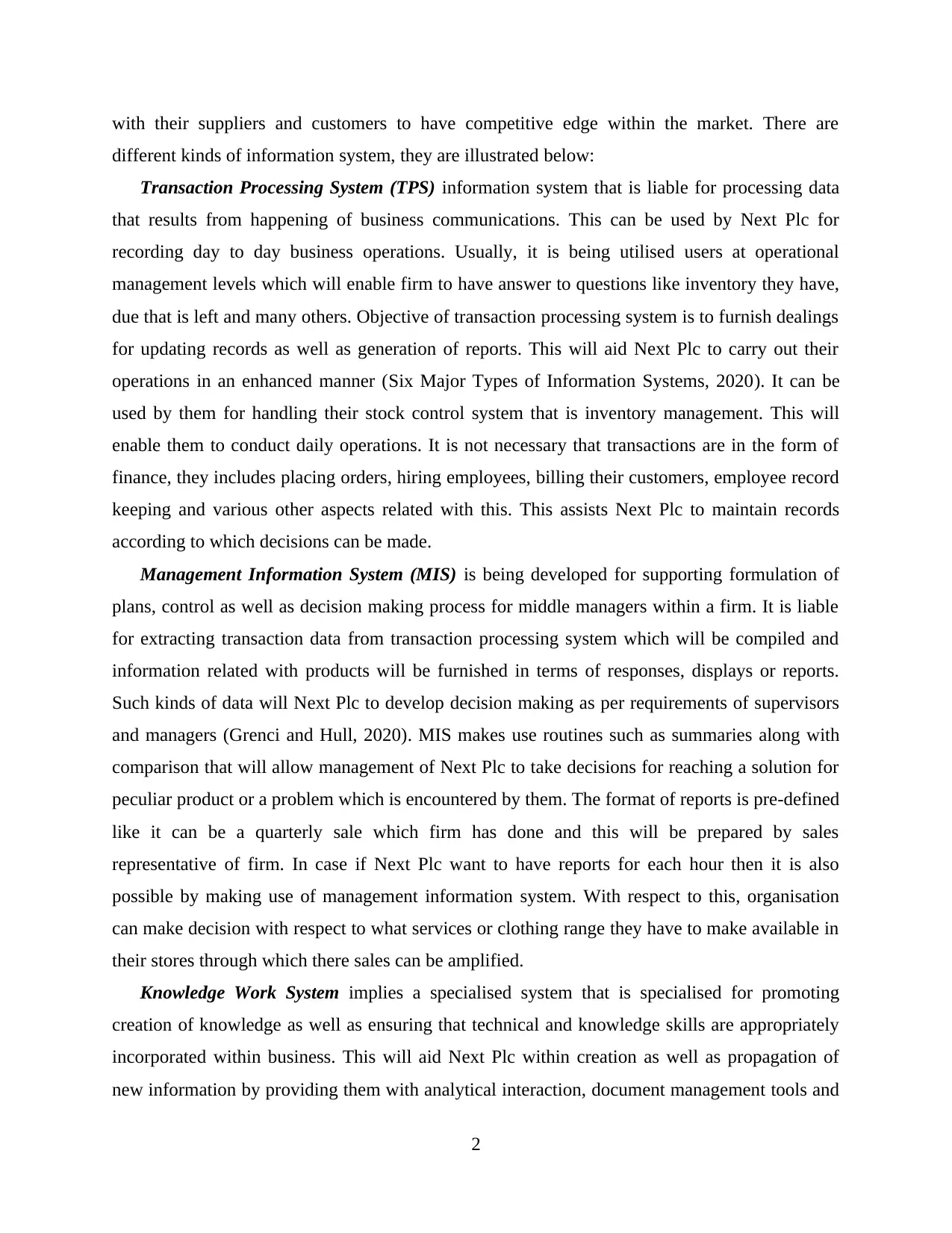
with their suppliers and customers to have competitive edge within the market. There are
different kinds of information system, they are illustrated below:
Transaction Processing System (TPS) information system that is liable for processing data
that results from happening of business communications. This can be used by Next Plc for
recording day to day business operations. Usually, it is being utilised users at operational
management levels which will enable firm to have answer to questions like inventory they have,
due that is left and many others. Objective of transaction processing system is to furnish dealings
for updating records as well as generation of reports. This will aid Next Plc to carry out their
operations in an enhanced manner (Six Major Types of Information Systems, 2020). It can be
used by them for handling their stock control system that is inventory management. This will
enable them to conduct daily operations. It is not necessary that transactions are in the form of
finance, they includes placing orders, hiring employees, billing their customers, employee record
keeping and various other aspects related with this. This assists Next Plc to maintain records
according to which decisions can be made.
Management Information System (MIS) is being developed for supporting formulation of
plans, control as well as decision making process for middle managers within a firm. It is liable
for extracting transaction data from transaction processing system which will be compiled and
information related with products will be furnished in terms of responses, displays or reports.
Such kinds of data will Next Plc to develop decision making as per requirements of supervisors
and managers (Grenci and Hull, 2020). MIS makes use routines such as summaries along with
comparison that will allow management of Next Plc to take decisions for reaching a solution for
peculiar product or a problem which is encountered by them. The format of reports is pre-defined
like it can be a quarterly sale which firm has done and this will be prepared by sales
representative of firm. In case if Next Plc want to have reports for each hour then it is also
possible by making use of management information system. With respect to this, organisation
can make decision with respect to what services or clothing range they have to make available in
their stores through which there sales can be amplified.
Knowledge Work System implies a specialised system that is specialised for promoting
creation of knowledge as well as ensuring that technical and knowledge skills are appropriately
incorporated within business. This will aid Next Plc within creation as well as propagation of
new information by providing them with analytical interaction, document management tools and
2
different kinds of information system, they are illustrated below:
Transaction Processing System (TPS) information system that is liable for processing data
that results from happening of business communications. This can be used by Next Plc for
recording day to day business operations. Usually, it is being utilised users at operational
management levels which will enable firm to have answer to questions like inventory they have,
due that is left and many others. Objective of transaction processing system is to furnish dealings
for updating records as well as generation of reports. This will aid Next Plc to carry out their
operations in an enhanced manner (Six Major Types of Information Systems, 2020). It can be
used by them for handling their stock control system that is inventory management. This will
enable them to conduct daily operations. It is not necessary that transactions are in the form of
finance, they includes placing orders, hiring employees, billing their customers, employee record
keeping and various other aspects related with this. This assists Next Plc to maintain records
according to which decisions can be made.
Management Information System (MIS) is being developed for supporting formulation of
plans, control as well as decision making process for middle managers within a firm. It is liable
for extracting transaction data from transaction processing system which will be compiled and
information related with products will be furnished in terms of responses, displays or reports.
Such kinds of data will Next Plc to develop decision making as per requirements of supervisors
and managers (Grenci and Hull, 2020). MIS makes use routines such as summaries along with
comparison that will allow management of Next Plc to take decisions for reaching a solution for
peculiar product or a problem which is encountered by them. The format of reports is pre-defined
like it can be a quarterly sale which firm has done and this will be prepared by sales
representative of firm. In case if Next Plc want to have reports for each hour then it is also
possible by making use of management information system. With respect to this, organisation
can make decision with respect to what services or clothing range they have to make available in
their stores through which there sales can be amplified.
Knowledge Work System implies a specialised system that is specialised for promoting
creation of knowledge as well as ensuring that technical and knowledge skills are appropriately
incorporated within business. This will aid Next Plc within creation as well as propagation of
new information by providing them with analytical interaction, document management tools and
2
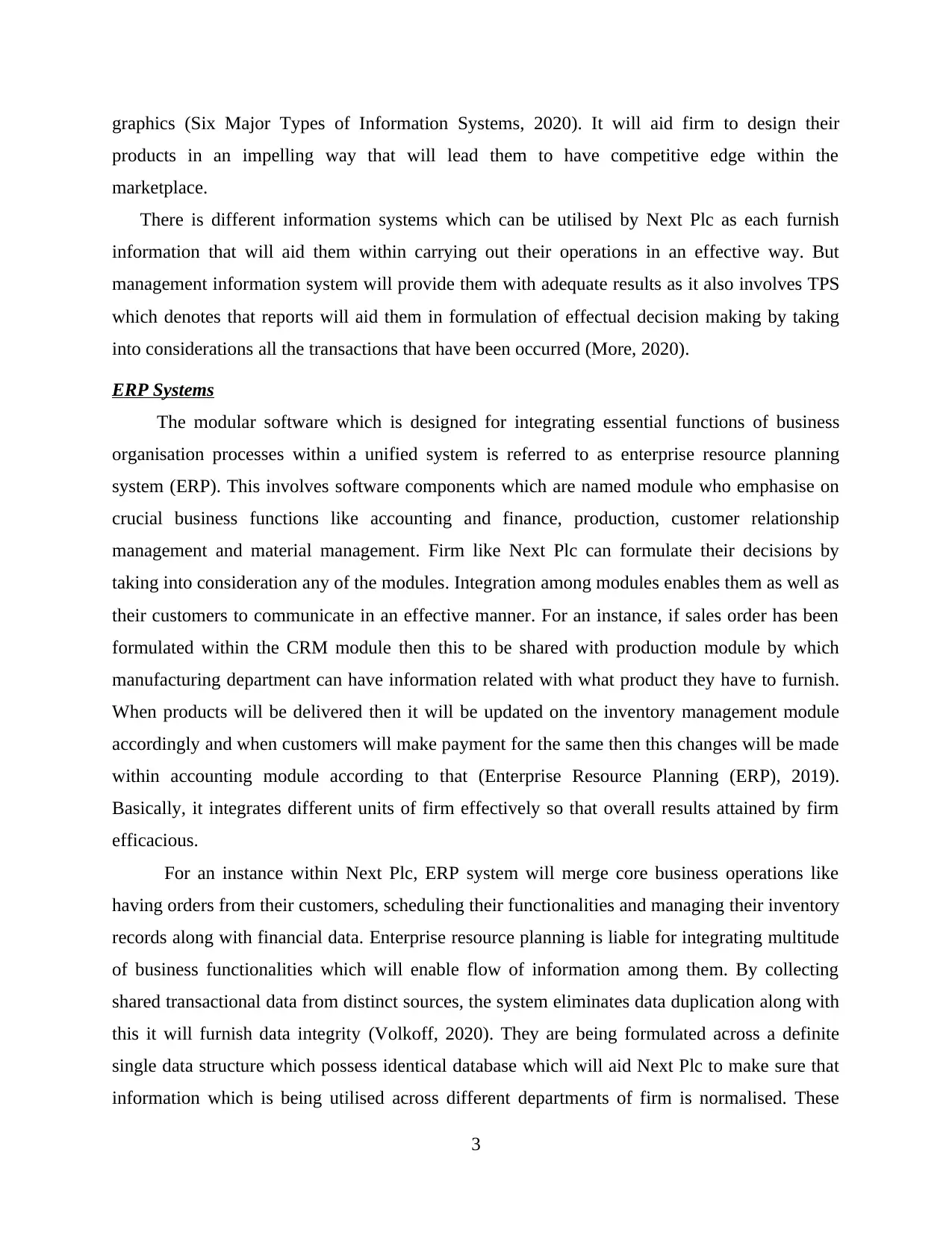
graphics (Six Major Types of Information Systems, 2020). It will aid firm to design their
products in an impelling way that will lead them to have competitive edge within the
marketplace.
There is different information systems which can be utilised by Next Plc as each furnish
information that will aid them within carrying out their operations in an effective way. But
management information system will provide them with adequate results as it also involves TPS
which denotes that reports will aid them in formulation of effectual decision making by taking
into considerations all the transactions that have been occurred (More, 2020).
ERP Systems
The modular software which is designed for integrating essential functions of business
organisation processes within a unified system is referred to as enterprise resource planning
system (ERP). This involves software components which are named module who emphasise on
crucial business functions like accounting and finance, production, customer relationship
management and material management. Firm like Next Plc can formulate their decisions by
taking into consideration any of the modules. Integration among modules enables them as well as
their customers to communicate in an effective manner. For an instance, if sales order has been
formulated within the CRM module then this to be shared with production module by which
manufacturing department can have information related with what product they have to furnish.
When products will be delivered then it will be updated on the inventory management module
accordingly and when customers will make payment for the same then this changes will be made
within accounting module according to that (Enterprise Resource Planning (ERP), 2019).
Basically, it integrates different units of firm effectively so that overall results attained by firm
efficacious.
For an instance within Next Plc, ERP system will merge core business operations like
having orders from their customers, scheduling their functionalities and managing their inventory
records along with financial data. Enterprise resource planning is liable for integrating multitude
of business functionalities which will enable flow of information among them. By collecting
shared transactional data from distinct sources, the system eliminates data duplication along with
this it will furnish data integrity (Volkoff, 2020). They are being formulated across a definite
single data structure which possess identical database which will aid Next Plc to make sure that
information which is being utilised across different departments of firm is normalised. These
3
products in an impelling way that will lead them to have competitive edge within the
marketplace.
There is different information systems which can be utilised by Next Plc as each furnish
information that will aid them within carrying out their operations in an effective way. But
management information system will provide them with adequate results as it also involves TPS
which denotes that reports will aid them in formulation of effectual decision making by taking
into considerations all the transactions that have been occurred (More, 2020).
ERP Systems
The modular software which is designed for integrating essential functions of business
organisation processes within a unified system is referred to as enterprise resource planning
system (ERP). This involves software components which are named module who emphasise on
crucial business functions like accounting and finance, production, customer relationship
management and material management. Firm like Next Plc can formulate their decisions by
taking into consideration any of the modules. Integration among modules enables them as well as
their customers to communicate in an effective manner. For an instance, if sales order has been
formulated within the CRM module then this to be shared with production module by which
manufacturing department can have information related with what product they have to furnish.
When products will be delivered then it will be updated on the inventory management module
accordingly and when customers will make payment for the same then this changes will be made
within accounting module according to that (Enterprise Resource Planning (ERP), 2019).
Basically, it integrates different units of firm effectively so that overall results attained by firm
efficacious.
For an instance within Next Plc, ERP system will merge core business operations like
having orders from their customers, scheduling their functionalities and managing their inventory
records along with financial data. Enterprise resource planning is liable for integrating multitude
of business functionalities which will enable flow of information among them. By collecting
shared transactional data from distinct sources, the system eliminates data duplication along with
this it will furnish data integrity (Volkoff, 2020). They are being formulated across a definite
single data structure which possess identical database which will aid Next Plc to make sure that
information which is being utilised across different departments of firm is normalised. These
3
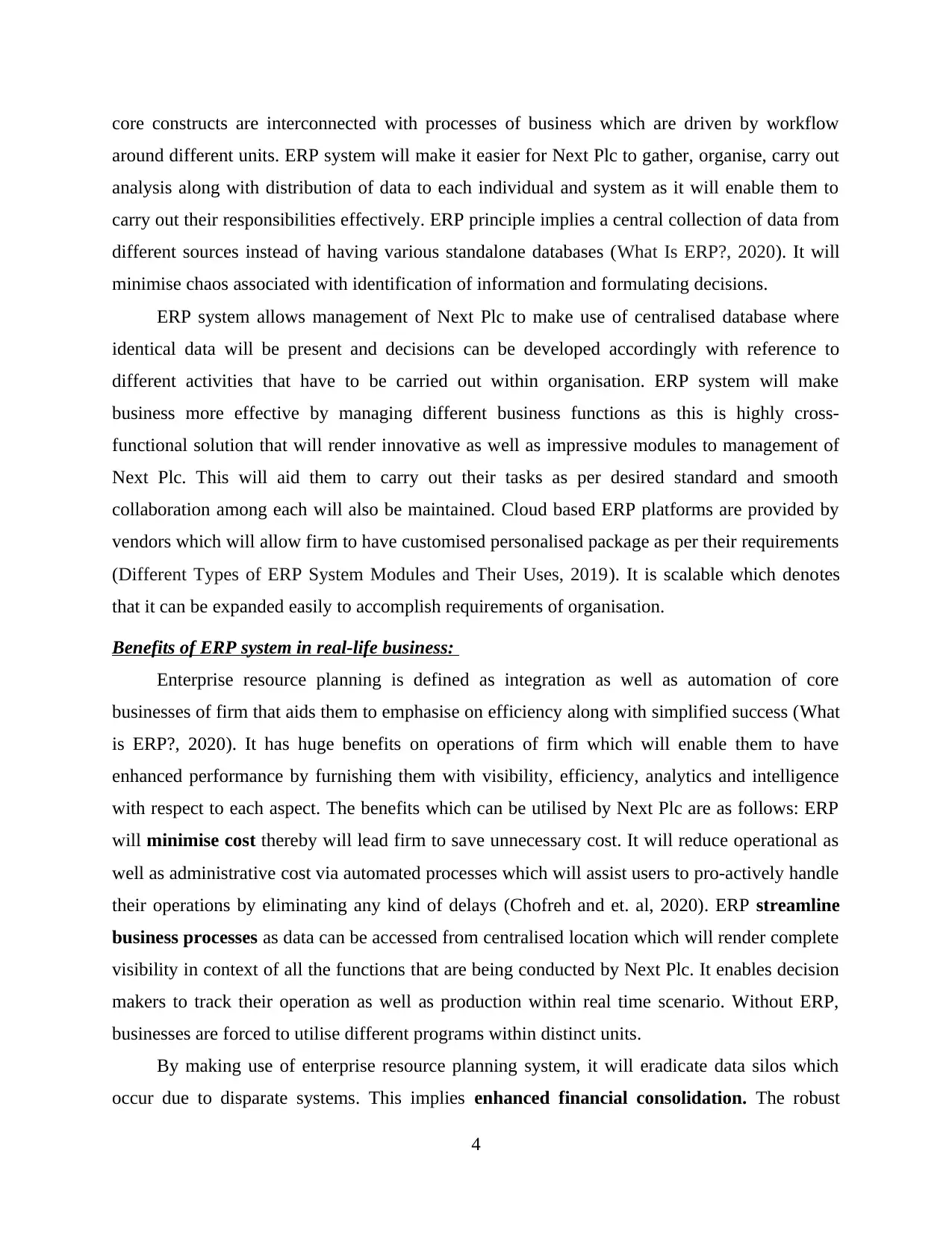
core constructs are interconnected with processes of business which are driven by workflow
around different units. ERP system will make it easier for Next Plc to gather, organise, carry out
analysis along with distribution of data to each individual and system as it will enable them to
carry out their responsibilities effectively. ERP principle implies a central collection of data from
different sources instead of having various standalone databases (What Is ERP?, 2020). It will
minimise chaos associated with identification of information and formulating decisions.
ERP system allows management of Next Plc to make use of centralised database where
identical data will be present and decisions can be developed accordingly with reference to
different activities that have to be carried out within organisation. ERP system will make
business more effective by managing different business functions as this is highly cross-
functional solution that will render innovative as well as impressive modules to management of
Next Plc. This will aid them to carry out their tasks as per desired standard and smooth
collaboration among each will also be maintained. Cloud based ERP platforms are provided by
vendors which will allow firm to have customised personalised package as per their requirements
(Different Types of ERP System Modules and Their Uses, 2019). It is scalable which denotes
that it can be expanded easily to accomplish requirements of organisation.
Benefits of ERP system in real-life business:
Enterprise resource planning is defined as integration as well as automation of core
businesses of firm that aids them to emphasise on efficiency along with simplified success (What
is ERP?, 2020). It has huge benefits on operations of firm which will enable them to have
enhanced performance by furnishing them with visibility, efficiency, analytics and intelligence
with respect to each aspect. The benefits which can be utilised by Next Plc are as follows: ERP
will minimise cost thereby will lead firm to save unnecessary cost. It will reduce operational as
well as administrative cost via automated processes which will assist users to pro-actively handle
their operations by eliminating any kind of delays (Chofreh and et. al, 2020). ERP streamline
business processes as data can be accessed from centralised location which will render complete
visibility in context of all the functions that are being conducted by Next Plc. It enables decision
makers to track their operation as well as production within real time scenario. Without ERP,
businesses are forced to utilise different programs within distinct units.
By making use of enterprise resource planning system, it will eradicate data silos which
occur due to disparate systems. This implies enhanced financial consolidation. The robust
4
around different units. ERP system will make it easier for Next Plc to gather, organise, carry out
analysis along with distribution of data to each individual and system as it will enable them to
carry out their responsibilities effectively. ERP principle implies a central collection of data from
different sources instead of having various standalone databases (What Is ERP?, 2020). It will
minimise chaos associated with identification of information and formulating decisions.
ERP system allows management of Next Plc to make use of centralised database where
identical data will be present and decisions can be developed accordingly with reference to
different activities that have to be carried out within organisation. ERP system will make
business more effective by managing different business functions as this is highly cross-
functional solution that will render innovative as well as impressive modules to management of
Next Plc. This will aid them to carry out their tasks as per desired standard and smooth
collaboration among each will also be maintained. Cloud based ERP platforms are provided by
vendors which will allow firm to have customised personalised package as per their requirements
(Different Types of ERP System Modules and Their Uses, 2019). It is scalable which denotes
that it can be expanded easily to accomplish requirements of organisation.
Benefits of ERP system in real-life business:
Enterprise resource planning is defined as integration as well as automation of core
businesses of firm that aids them to emphasise on efficiency along with simplified success (What
is ERP?, 2020). It has huge benefits on operations of firm which will enable them to have
enhanced performance by furnishing them with visibility, efficiency, analytics and intelligence
with respect to each aspect. The benefits which can be utilised by Next Plc are as follows: ERP
will minimise cost thereby will lead firm to save unnecessary cost. It will reduce operational as
well as administrative cost via automated processes which will assist users to pro-actively handle
their operations by eliminating any kind of delays (Chofreh and et. al, 2020). ERP streamline
business processes as data can be accessed from centralised location which will render complete
visibility in context of all the functions that are being conducted by Next Plc. It enables decision
makers to track their operation as well as production within real time scenario. Without ERP,
businesses are forced to utilise different programs within distinct units.
By making use of enterprise resource planning system, it will eradicate data silos which
occur due to disparate systems. This implies enhanced financial consolidation. The robust
4
Paraphrase This Document
Need a fresh take? Get an instant paraphrase of this document with our AI Paraphraser
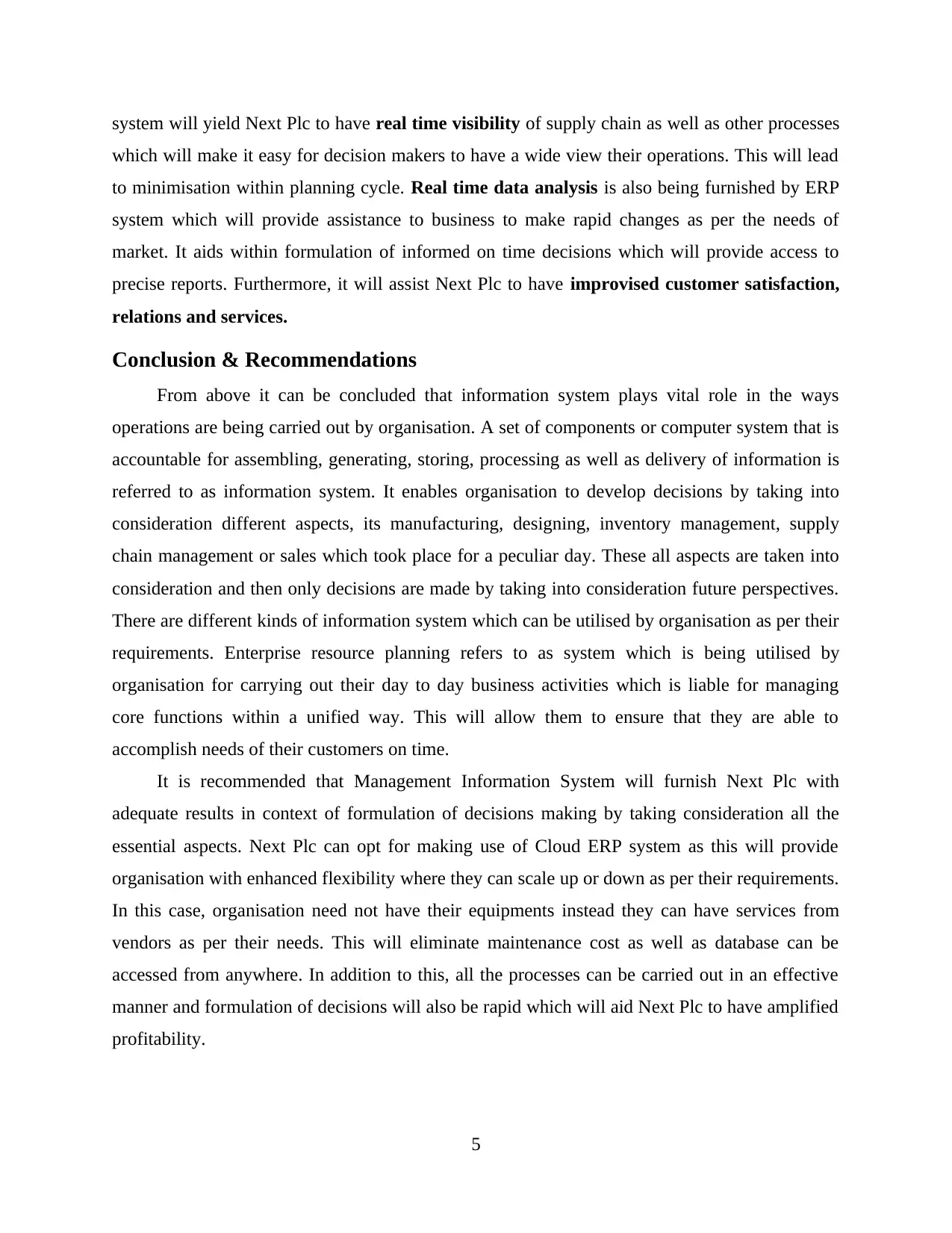
system will yield Next Plc to have real time visibility of supply chain as well as other processes
which will make it easy for decision makers to have a wide view their operations. This will lead
to minimisation within planning cycle. Real time data analysis is also being furnished by ERP
system which will provide assistance to business to make rapid changes as per the needs of
market. It aids within formulation of informed on time decisions which will provide access to
precise reports. Furthermore, it will assist Next Plc to have improvised customer satisfaction,
relations and services.
Conclusion & Recommendations
From above it can be concluded that information system plays vital role in the ways
operations are being carried out by organisation. A set of components or computer system that is
accountable for assembling, generating, storing, processing as well as delivery of information is
referred to as information system. It enables organisation to develop decisions by taking into
consideration different aspects, its manufacturing, designing, inventory management, supply
chain management or sales which took place for a peculiar day. These all aspects are taken into
consideration and then only decisions are made by taking into consideration future perspectives.
There are different kinds of information system which can be utilised by organisation as per their
requirements. Enterprise resource planning refers to as system which is being utilised by
organisation for carrying out their day to day business activities which is liable for managing
core functions within a unified way. This will allow them to ensure that they are able to
accomplish needs of their customers on time.
It is recommended that Management Information System will furnish Next Plc with
adequate results in context of formulation of decisions making by taking consideration all the
essential aspects. Next Plc can opt for making use of Cloud ERP system as this will provide
organisation with enhanced flexibility where they can scale up or down as per their requirements.
In this case, organisation need not have their equipments instead they can have services from
vendors as per their needs. This will eliminate maintenance cost as well as database can be
accessed from anywhere. In addition to this, all the processes can be carried out in an effective
manner and formulation of decisions will also be rapid which will aid Next Plc to have amplified
profitability.
5
which will make it easy for decision makers to have a wide view their operations. This will lead
to minimisation within planning cycle. Real time data analysis is also being furnished by ERP
system which will provide assistance to business to make rapid changes as per the needs of
market. It aids within formulation of informed on time decisions which will provide access to
precise reports. Furthermore, it will assist Next Plc to have improvised customer satisfaction,
relations and services.
Conclusion & Recommendations
From above it can be concluded that information system plays vital role in the ways
operations are being carried out by organisation. A set of components or computer system that is
accountable for assembling, generating, storing, processing as well as delivery of information is
referred to as information system. It enables organisation to develop decisions by taking into
consideration different aspects, its manufacturing, designing, inventory management, supply
chain management or sales which took place for a peculiar day. These all aspects are taken into
consideration and then only decisions are made by taking into consideration future perspectives.
There are different kinds of information system which can be utilised by organisation as per their
requirements. Enterprise resource planning refers to as system which is being utilised by
organisation for carrying out their day to day business activities which is liable for managing
core functions within a unified way. This will allow them to ensure that they are able to
accomplish needs of their customers on time.
It is recommended that Management Information System will furnish Next Plc with
adequate results in context of formulation of decisions making by taking consideration all the
essential aspects. Next Plc can opt for making use of Cloud ERP system as this will provide
organisation with enhanced flexibility where they can scale up or down as per their requirements.
In this case, organisation need not have their equipments instead they can have services from
vendors as per their needs. This will eliminate maintenance cost as well as database can be
accessed from anywhere. In addition to this, all the processes can be carried out in an effective
manner and formulation of decisions will also be rapid which will aid Next Plc to have amplified
profitability.
5
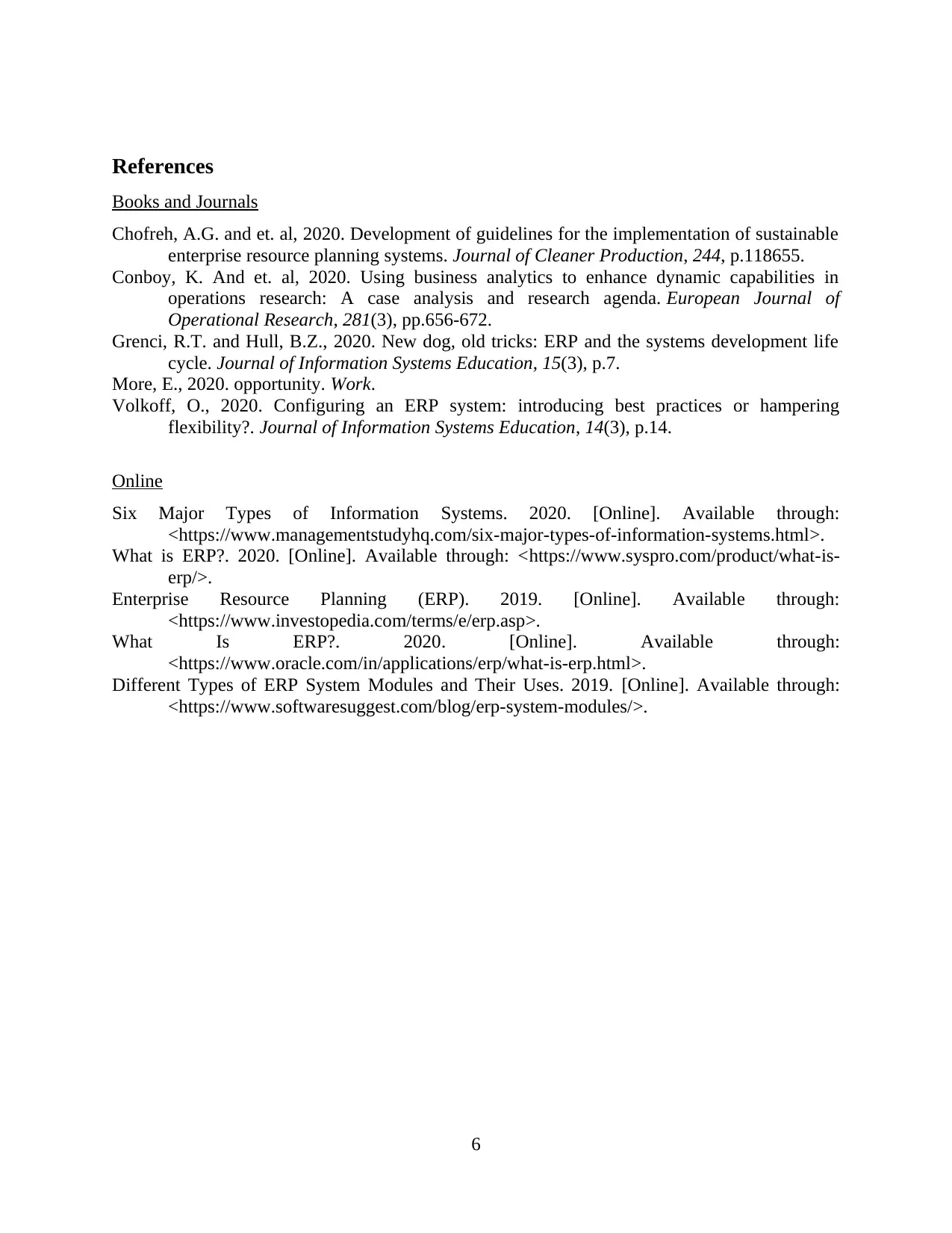
References
Books and Journals
Chofreh, A.G. and et. al, 2020. Development of guidelines for the implementation of sustainable
enterprise resource planning systems. Journal of Cleaner Production, 244, p.118655.
Conboy, K. And et. al, 2020. Using business analytics to enhance dynamic capabilities in
operations research: A case analysis and research agenda. European Journal of
Operational Research, 281(3), pp.656-672.
Grenci, R.T. and Hull, B.Z., 2020. New dog, old tricks: ERP and the systems development life
cycle. Journal of Information Systems Education, 15(3), p.7.
More, E., 2020. opportunity. Work.
Volkoff, O., 2020. Configuring an ERP system: introducing best practices or hampering
flexibility?. Journal of Information Systems Education, 14(3), p.14.
Online
Six Major Types of Information Systems. 2020. [Online]. Available through:
<https://www.managementstudyhq.com/six-major-types-of-information-systems.html>.
What is ERP?. 2020. [Online]. Available through: <https://www.syspro.com/product/what-is-
erp/>.
Enterprise Resource Planning (ERP). 2019. [Online]. Available through:
<https://www.investopedia.com/terms/e/erp.asp>.
What Is ERP?. 2020. [Online]. Available through:
<https://www.oracle.com/in/applications/erp/what-is-erp.html>.
Different Types of ERP System Modules and Their Uses. 2019. [Online]. Available through:
<https://www.softwaresuggest.com/blog/erp-system-modules/>.
6
Books and Journals
Chofreh, A.G. and et. al, 2020. Development of guidelines for the implementation of sustainable
enterprise resource planning systems. Journal of Cleaner Production, 244, p.118655.
Conboy, K. And et. al, 2020. Using business analytics to enhance dynamic capabilities in
operations research: A case analysis and research agenda. European Journal of
Operational Research, 281(3), pp.656-672.
Grenci, R.T. and Hull, B.Z., 2020. New dog, old tricks: ERP and the systems development life
cycle. Journal of Information Systems Education, 15(3), p.7.
More, E., 2020. opportunity. Work.
Volkoff, O., 2020. Configuring an ERP system: introducing best practices or hampering
flexibility?. Journal of Information Systems Education, 14(3), p.14.
Online
Six Major Types of Information Systems. 2020. [Online]. Available through:
<https://www.managementstudyhq.com/six-major-types-of-information-systems.html>.
What is ERP?. 2020. [Online]. Available through: <https://www.syspro.com/product/what-is-
erp/>.
Enterprise Resource Planning (ERP). 2019. [Online]. Available through:
<https://www.investopedia.com/terms/e/erp.asp>.
What Is ERP?. 2020. [Online]. Available through:
<https://www.oracle.com/in/applications/erp/what-is-erp.html>.
Different Types of ERP System Modules and Their Uses. 2019. [Online]. Available through:
<https://www.softwaresuggest.com/blog/erp-system-modules/>.
6
1 out of 9
Related Documents
Your All-in-One AI-Powered Toolkit for Academic Success.
+13062052269
info@desklib.com
Available 24*7 on WhatsApp / Email
![[object Object]](/_next/static/media/star-bottom.7253800d.svg)
Unlock your academic potential
© 2024 | Zucol Services PVT LTD | All rights reserved.





